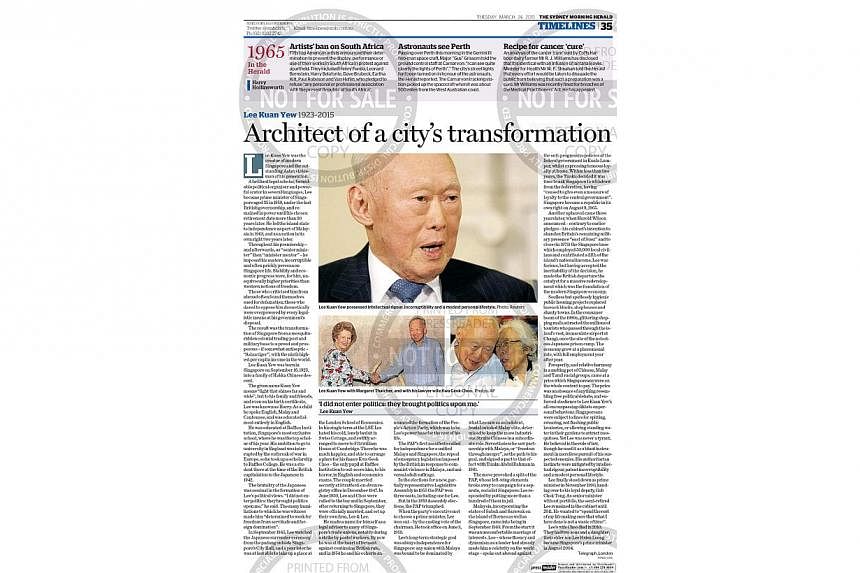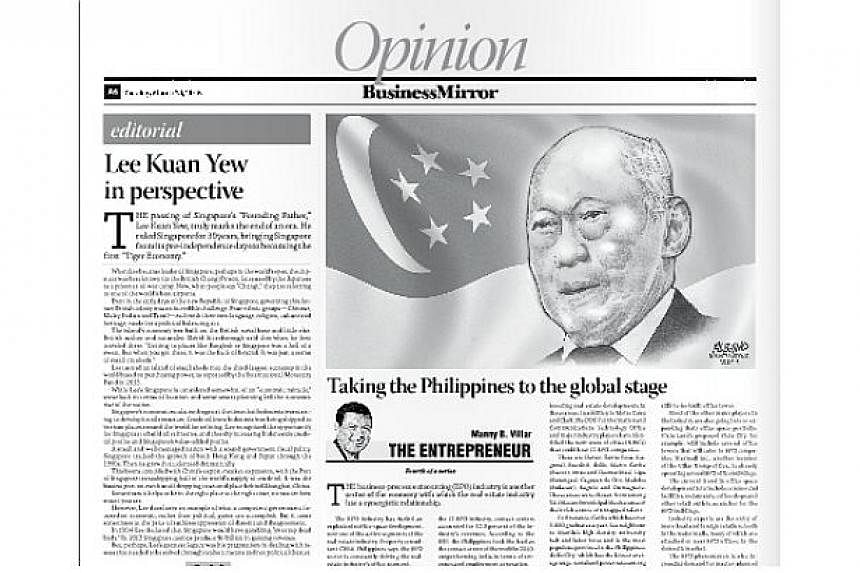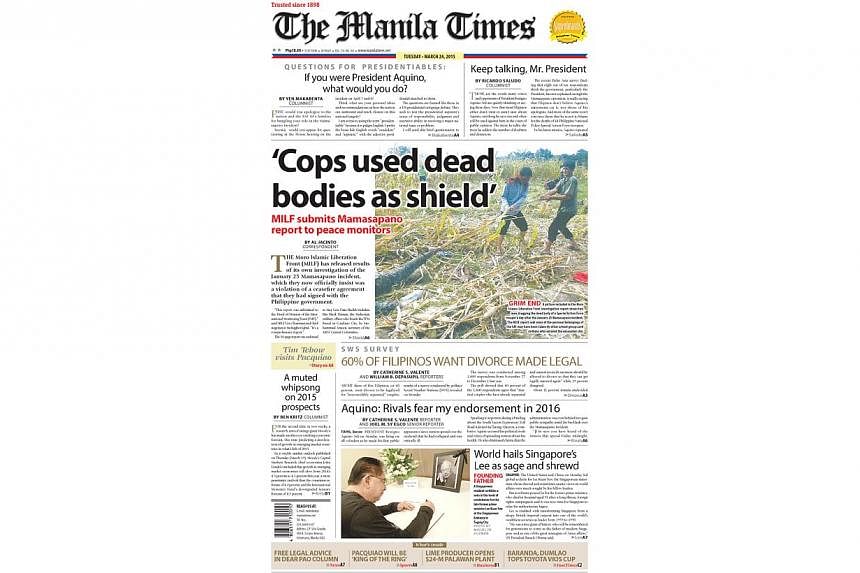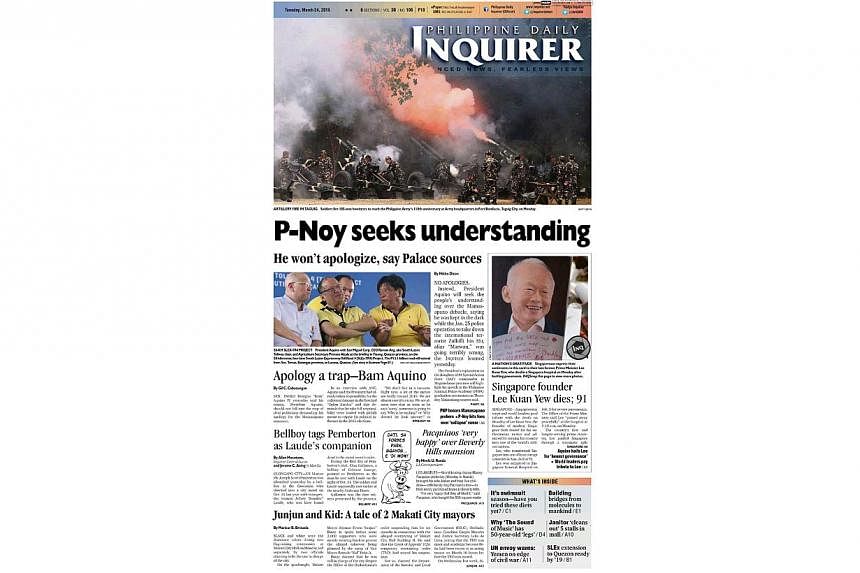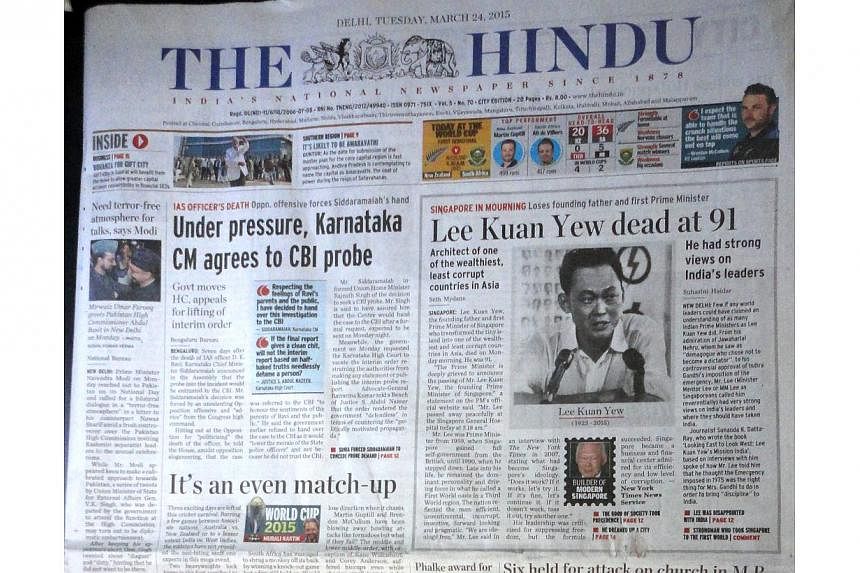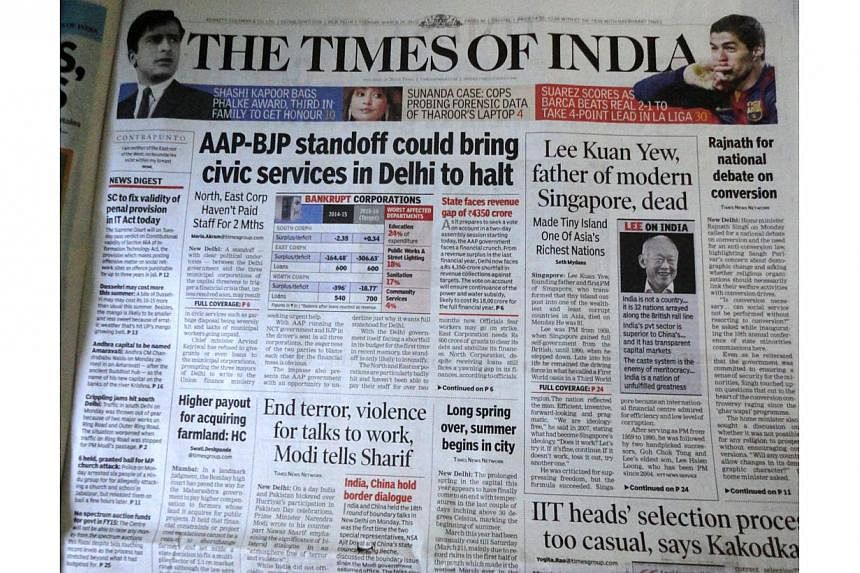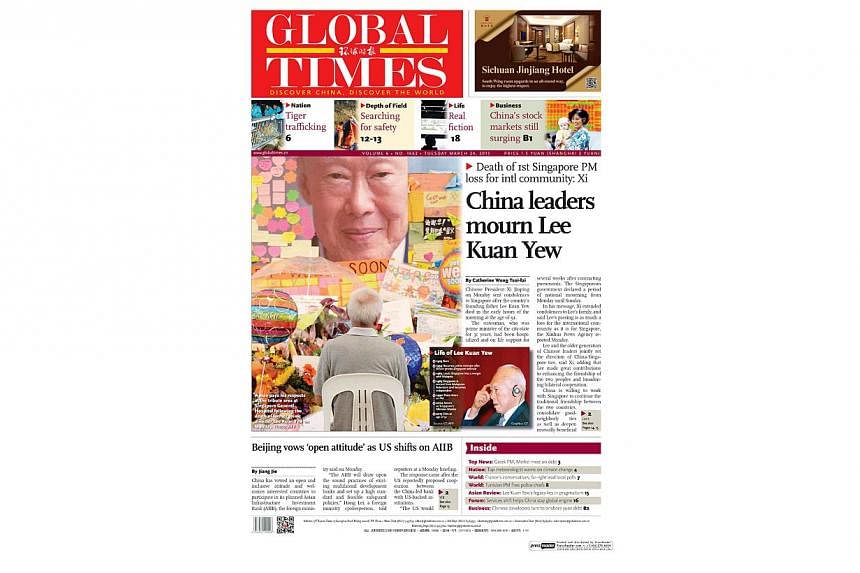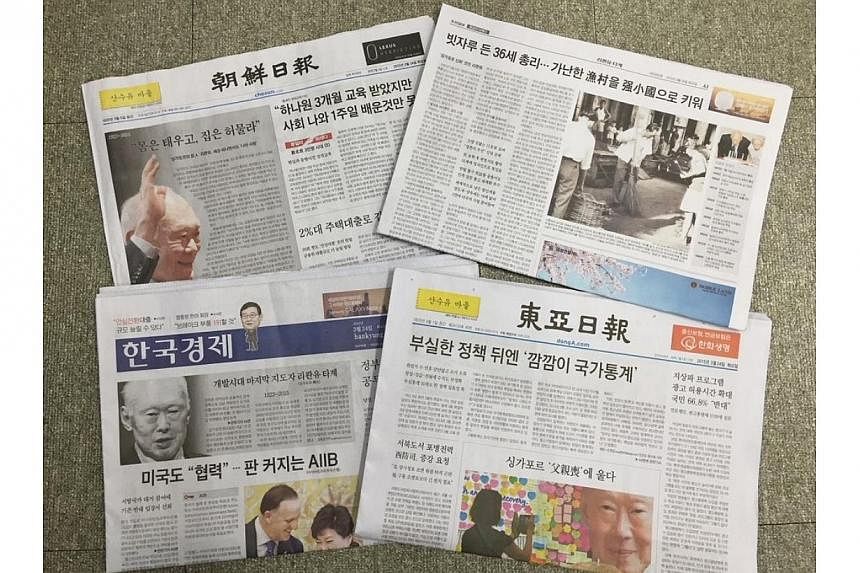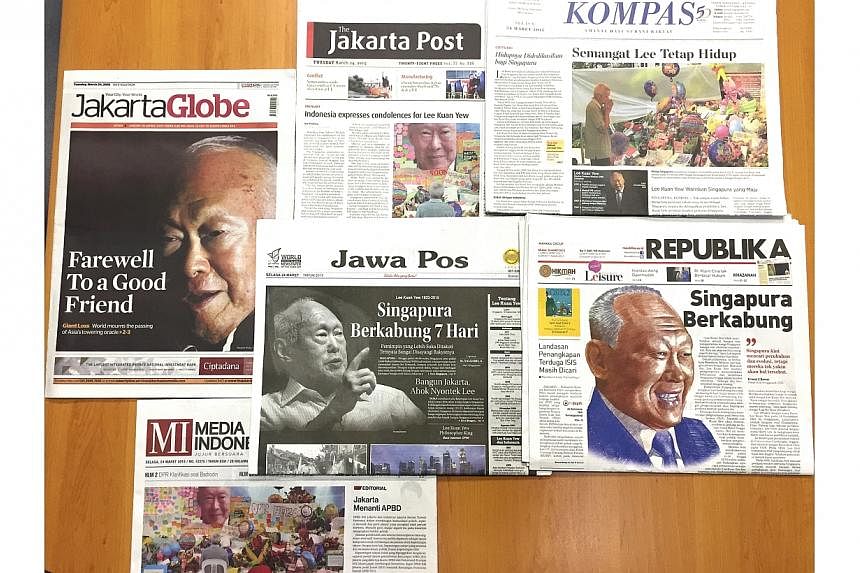The death of Singapore's first prime minister Lee Kuan Yew was front-page headline in major newspapers in Asia. The news was also prominently reported beyond Asia.
Here's a look at how some of the newspapers paid tribute to the founding father of Singapore, who died on Monday at the age of 91.
Malaysia

Two major Chinese-language dailies - Sin Chew Daily and China Press - published front-page tributes to Mr Lee. Another Chinese-language daily, Nanyang Siang Pau, carried a blurb on Mr Lee across the top of the front page. News of his death was also among the most viewed articles on the websites of the three newspapers.
Although the coronation of Johor's Sultan dominated front pages of most English and Malay newspapers in Malaysia, Mr Lee's passing was also prominently reported.
The flagship publications under ruling Umno's control - New Straits Times (NST), Berita Harian and Utusan Malaysia - all ran black-and-white photos of Singapore's founding father on their covers. NST said Mr Lee "had transformed the republic from an island trading post into an economic powerhouse".
Malaysia's top English-language newspaper The Star had four pages on Mr Lee, headlined "Malaysians share the grief". Even business paper, The Edge Financial Daily, had a three-page spread on his legacy titled "the economic miracle" of Singapore.
Malay newspapers that are so often critical of Singapore and its leaders also had several pages in honour of the "architect of modern Singapore", as Berita Harian described him.
Thailand
News about Mr Lee Kuan Yew's death was splashed across the covers Thai newspapers on Tuesday, with the Bangkok Post devoting its entire front page to the Singapore statesman.
"He was a towering figure devoting his life for everything that is better and possible for his people," the Post quoted former foreign minister Surin Pitsuwan as saying. Inside, the Post devoted two pages to his key sayings and his reputation among other world leaders.
Mr Lee's death was also the top story in The Nation, another English broadsheet. In its editorial, the Nation said "it is the recipe of fair laws, enforced fairly and transparently, that is true to Lee's legacy as a world leader of renown".
Its editorial cartoon depicted the half-lion, half-fish Singapore mascot called Merlion, spouting tears rather than the usual stream of water from its mouth.
Thai language papers like Matichon, Khaosod and Manager Daily similarly ran pictures of Mr Lee and his wake on their front pages.
Columnists, meanwhile, used his death to focus the lens on Thailand's progress, by highlighting Mr Lee's previous sayings about the Kingdom. Bangkok Post contributing editor Atiya Achakulwisit related how Mr Lee felt that the Thai military's interference "has resulted in a perpetual state of political uncertainty" and "shaken the confidence of investors".
Indonesia
There was extensive coverage of Mr Lee's death in Indonesia, with at least six morning newspapers reporting the news on their front covers. The Jakarta Post devoted five pages to "the sage and giant of South-east Asia", as one editorial described him. The Jakarta Globe also paid front-page tribute to Mr Lee with the headline "Farewell to a good friend". In its five pages of coverage, the newspaper said that Indonesia remembers him as an "inspiration".
A commentary in Jawa Pos newspaper referred to Mr Lee as "The Philosopher King", while Republika described him as a "friend" with a sharp tongue. Kompas said that Mr Lee's spirit will live on, adding that he leaves behind a successful Singapore. Media Indonesia described him as an authoritarian with merit and "a father of the nation loved by its people".
China

News of Mr Lee's death appeared on the front pages of China's major dailies, including state newspapers People's Daily and Liberation Daily. Both carried reports in the prominent top right-hand corner of their covers, on Chinese leaders' condolences over his passing.
A few newspapers, such as Beijing Times and Southern Metropolis Daily, carried half-page photos on their covers of Mr Lee's portrait or the public in Singapore signing condolence books. Even local papers from northeastern Shenyang and central Wuhan cities reported prominently on him.
Several national newspapers such as the Global Times and China Daily also ran editorials on Mr Lee, pointing out his background as a Chinese with ancestral roots in southern Guangdong and highlighting his achievements in turning Singapore from a fishing outpost into a first-world economy.
India

All the English-language Indian newspapers covered Mr Lee's death prominently, with two leading newspapers running it as the page one lead story.
The Times of India had the story on the top right corner on page one, with the headline "Lee Kuan Yew, father of modern Singapore, dead". It also ran stories on inside pages, describing Mr Lee as "a tall statesman, one who was probably too big for Singapore". There was also a piece on his views on India, headlined "No single leader can change India".
The Hindu ran two stories on Mr Lee on its cover, saying he had "strong views on India's leaders". It also covered reactions from Indians, including Prime Minister Narendra Modi who called him "a lion among leaders".
The Philippines

Mr Lee's death received extensive coverage in the Philippines, with three major dailies - the Philippine Daily Inquirer, Philippine Star and Manila Bulletin - displaying stories and his photos prominently on their front pages.
Most of the papers published two articles: a main story announcing his death and President Benigno Aquino's condolence message, and a second story on international reactions that appeared as the cover story in their World pages.
The Philippine Star, Manila Times and Business Mirror wrote editorials about Mr Lee, extolling how he transformed Singapore from a backwater into one of the world's economic powerhouses, and what the Philippines can learn from them.
The online editions of the major dailies also ran a stream of stories about Mr Lee. Topping the list was "15 things Lee Kuan Yew said about the Philippines", mostly excerpts from his book, From Third World To First. His most shared quote was "Only in the Philippines could a leader like Ferdinand Marcos, who pillaged his country for over 20 years, still be considered for a national burial."
South Korea
Following South Korean president Park Geun Hye's announcement on Monday that she will attend Mr Lee's funeral, most major newspapers in the country carried reports of his death prominently.
The biggest daily Chosun Ilbo devoted a quarter of its cover to "Singapore giant Lee Kuan Yew whose love for his country transcends death", as well as an inside page chronicling his encounters with Korean leaders, most notably Ms Park and her late father, former president Park Chung Hee. In another page, a young Mr Lee is seen sweeping the street with a broom in hand, with the story describing how he successfully turned a poor fishing village into a small but strong country.
Dong-A Ilbo ran a photo of Mr Lee's portrait on a tribute wall as the main visual on its cover, with the headline "Singapore cries over the death of its father", while The Korea Economic Daily had Mr Lee's portrait right below its masthead, lamenting the loss of the "last leader from the development era".
News of Mr Lee's death also dominated online news sites in Korea, with many focusing on his friendship with Mr Park and the similarities between them - both had ruled with an iron fist and were credited with the rapid post-war development and economic expansion in their countries. Coincidentally, their children - Ms Park and Mr Lee Hsien Loong - are born eight days apart in February 1952 and have since become their successors.
Australia

Newspapers in Australia devoted multiple pages to Mr Lee's death and legacy, paying tribute to his success in transforming Singapore into a modern economic powerhouse but criticising his "ruthless" approach to cracking down on political opponents and restricting free speech.
An editorial in The Australian praised "Mr Lee's stern but benevolent leadership". Welcoming his contribution to Singapore's prosperity, the newspaper stated: "Mr Lee believed in sacrificing liberal democracy and freedom as a necessary price for stability and prosperity, a view with which we disagree."
The paper's foreign editor Greg Sheridan also wrote "Singapore, Asia generally, and Australia in particular, benefited enormously from the astute and steely leadership of one of the most remarkable figures ever produced in Southeast Asia".
But in The Sydney Morning Herald, Mr Lee was described as a "stern patriarch" in a piece by Lindsay Murdoch, who was based in Singapore from 1989 to 1996.
"Mr Lee's strong grip and dominant personality shaped Singapore into becoming a place envied by most of the world where everything seems to work with super-efficiency," Mr Murdoch wrote. "Mr Lee's passing will be a difficult time for Singaporeans."
The United States
On a day where US headlines were dominated by the first official candidate announcement in the US presidential election and the worsening crisis in Yemen, Mr Lee's death still made the front pages of several top newspapers.
The New York Times, the Wall Street Journal and the Los Angeles Times all ran their stories on Mr Lee on the front page, often accompanied by a small photo of the leader. While the Washington Post left its stories about Mr Lee on the inside pages, it blurbed the articles on the front page with a photo of Mr Lee with former secretary of state Hillary Clinton.
As a whole, the stories reflected the often conflicted attitude the American media outlets have with Mr Lee. Some like the Washington Post used his death to revisit incidents in the past where American newspapers had been sued by Mr Lee for libel.
And so while all hailed his achievements in building up Singapore to what it is today, there were many questions raised about the cost of Mr Lee's tactics. The Washington Post editorial was published with the sub-headline: "Singapore's longtime leader did wonders for his country, but he was wrong about democracy."
The New York Times, one of the newspapers that had clashed with Mr Lee, went with a more subtle headline: "A firm hand that pushed Singapore forward."
(Inputs from Shannon Teoh, Tan Hui Yee, Kua Yu-lin, Zubaidah Nazeer, Kor Kian Beng, Nirmala Ganapathy, Raul Dancel, Chang May Choon, Jonathan Pearlman, Jeremy Au Yong)
